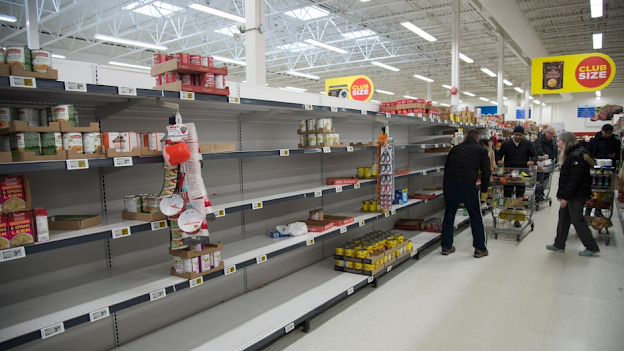Global Food Crisis: COVID-19 worsen the situation
The novel corona-virus disease (COVID-19) is having an
unprecedented impact around the world, both in health
and socioeconomic terms. Although, a full-blown global food crisis, multiple
famines, or prolonged food system problems as a result of COVID-19 could
create larger humanitarian damage over the next two to five years
compared to direct damage from the virus itself.
While COVID-19 does not discriminate, the 55 countries and
territories that are home to 135 million acutely food-insecure
people in need of urgent humanitarian food and nutrition
assistance are the most vulnerable to the consequences of this
pandemic as they have very limited or no capacity to cope with
either the health or socioeconomic aspects of the shock.
Major causes by COVID-19:
On the food supply side, harvests have been good and the 2020
outlook for staple crops is promising. However, movement
restrictions necessary to contain the spread of the virus will
disrupt the transport and processing of food and other critical
goods, increasing delivery times and reducing availability of
even the most basic food items.
For households dependent on
food production and livestock rearing, disruption in the
supply chain of agricultural inputs or the inability to access
livestock markets, leading to declines in crop and livestock
production and sales. The
pandemic disrupted global supply chains, induced panic buying and
cleared supermarket shelves. It left perfectly edible produce rotting in
fields, and left farmers no choice but to gas, shoot and bury their
livestock because slaughter plants were shut down.
It
also revealed a glaring problem: Though researchers have known for
decades that climate change will roil farming and food systems, there
exists no clear global strategy for building resilience and managing
risks in the world's food supply, nor a coherent way to tackle the
challenge of feeding a growing global population, on a warming planet
where food crises are projected to intensify.
Rising unemployment and under-employment is likely to
severely reduce people’s purchasing power. Urban populations,
particularly daily wage earners in the informal economies and
service sector employees, are particularly at risk of losing their
income sources as a result of regulations on social distancing and
government restrictions to minimize transmission.
Some Potential Solutions to be considered:
When it comes to food production, climate variability can increase disparities between short-term demand and supply among regions. So long as this variability is not correlated across regions, trade flows, combined with storage, could effectively diversify climate risk on a global scale, meaning less volatility in food prices. A rapidly changing climate and volatile markets added to trade restrictions proliferation could put the food security of millions at risk. Therefore, polices that promote free and open trade should be incentivized. The current state of international trade negotiations is moribund; but trade to facilitate adaptation to short-term climate variability related to climate change might be a way to restart negotiations.
Considering the erratic, shifting climate conditions, an international group of food, farming and environment experts released a "blueprint"
for making food production more resilient to both climate and
non-climate shocks that calls for $320 billion in public and private
funding to transform food systems. "The
disruptions caused by this terrible pandemic have at least awakened the
world to the fact that our food systems are far more vulnerable than
many realized," said Bruce Campbell, a director with the group that crafted the blueprint. "Climate change is already compounding
these problems, but the solutions we present—which seek bold
transformations in everything from farming to trade, diets and
government policies—offer an opportunity to pursue a much brighter
future for people and our planet."
Using a smart scale
system to monitor food waste could help manage and reduce food waste. We can initiate or support things by: 1) appointing “Food Waste Champions” in each store to motivate colleagues at work and home; 2) appointing a
“Country Implementation Responsible” person for targeted markets to lead implementation and support co-workers.
IKEA, a well known multinational company has implemented this strategies and
experienced a 20% reduction in food waste within 12 weeks of starting the food waste-reduction initiative and found that
additional investments mostly had a 20-week payback period. IKEA plans to also address food loss and waste with its
suppliers and to encourage consumers to reduce food waste at home.
To end this hunger crisis, governments
must also build fairer, more robust, and more sustainable food systems,
that put the interests of food producers and workers before the profits
of big food and agri business.
If you find this post useful, help it get spread by sharing with a friend or on Twitter or Facebook. Thank you!
Published By
Shamli Deshmukh | World Uncensored.
Follow us on instagram
Subscribe our Youtube Channel.
Write us to worlduncensored1@gmail.com. 






Comments
Post a Comment